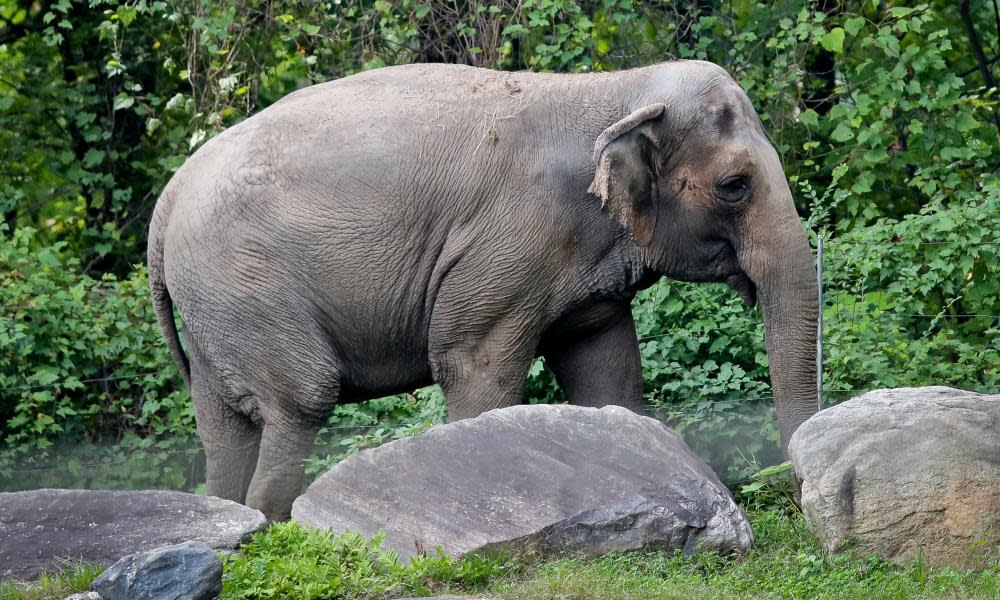Lawyers argue Happy the elephant should have the same rights as humans

Lawyers representing an elephant have argued in New York court that their trunked client be considered a person, in a fresh attempt to upend human dominance over this designation.
Related: Chris the Merino sheep famed for his record-breaking fleece has died
Happy the elephant is, contrary to her sunny name, being detained by the Bronx Zoo “illegally”, due to her personhood, and must be released, according to her self-appointed legal team.
The case’s instigator, an animal rights group, hopes it will effect a legal breakthrough that will elevate the status of elephants, which the group calls “extraordinarily complex creatures” similar to humans that should have the fundamental right to liberty.
On Monday, the Bronx supreme court was the latest stage in what has been a quixotic pursuit of animal personhood by the Nonhuman Rights Project. Steven Wise, the founder and lead attorney of the group, has led a quest that is dogged – appropriately, as he has ruminated that dogs may be “legal persons”, too – to confer personhood on a pair of chimpanzees and now Happy.
Wise has yet to taste success. In 2017, a New York appeals court ruled that Kiko and Tommy, two chimps in their 30s kept in captivity in the state, could not be considered persons in order to invoke habeas corpus – the right to avoid unlawful detention.
A presiding judge wrote that while chimps share many fundamental characteristics of humans, it would be difficult to hold any ape to account for its personhood by arresting and prosecuting it for a crime. A further blow to Wise came in August, when a Connecticut court similarly decided that three elephants – Beulah, Minnie and Karen – could not be deemed persons.
Undeterred, Wise is now arguing on behalf of Happy, an animal that scientists found can recognize herself in a mirror. The 47-year-old elephant has spent almost all her life in a one-acre enclosure at the Bronx Zoo after being captured along with six other calves – named Sleepy, Grumpy, Sneezy, Doc, Dopey and Bashful – in Thailand and brought to the US.
Happy and Grumpy cohabited until 2002, when they were relocated to an enclosure with two other elephants – Maxine and Patty. This arrangement turned sour when Maxine and Patty fatally attacked Grumpy. Happy has never been able to live contentedly with the duo, with a recent reconciliation attempt ending badly.
Happy’s lone captivity is anathema to the intricate social arrangements elephants have in the wild, according to experts cited by the Nonhuman Rights Project, which wants her relocated to a far larger sanctuary in California that has other elephants.
“Wouldn’t that just be like a larger prison?” asked the Bronx supreme court judge Alison Tuitt, who earlier in proceedings remarked that she had watched a TV show in which a lemur attacked its own reflection in the mirror.
“That’s a bit like saying the Earth is a prison,” Wise replied. The two later had an inconclusive exchange over whether a guide dog could claim personhood.
During lengthy testimony, Wise compared Happy’s situation to the plight of slaves in the US, who weren’t considered fully human, and pointed out how a river in New Zealand and a Colombian portion of the Amazon rainforest have been granted human-like rights. “She is one depressed elephant,” Wise said of Happy, unhappily. “She’s being harmed every day.”
The Wildlife Conservation Society (WCS), which runs Bronx Zoo, strongly rejects any notion that Happy is distressed or badly treated. Jim Breheny, the zoo’s director, has called the lawsuit “ludicrous” and said the Nonhuman Rights Project is “exploiting the Bronx Zoo elephants to advance their own failing cause”.
WCS said that Happy is not kept in isolation given that she has tactile contact with Patty through a barrier, to ensure neither elephant is hurt. The conservation organization said that Happy is “subordinate in nature”, is comfortable with her keepers and likely to be bullied by other elephants if she were to be moved. The zoo has declined to add additional elephants for the past decade.
“It would be irresponsible and risky for Happy’s wellbeing for us to bow to uninformed outside voices with political agendas,” a WCS spokesperson said.
Polling of Americans has shown strong support for granting animals the same rights as humans, with the concept also backed by some philosophers who argue that animals have moral standing and shouldn’t be considered merely as property.
US courts, however, disagree and critics have claimed unintended consequences of animal personhood, such as the potential erosion of rights of disabled people, and difficulties defining which animals deserve rights and who speaks for them.
The idea of “freedom” from humans may also be more opaque at second glance. On Monday, across the road from the court in the Bronx’s Joyce Kilmer Park, starlings cavorted in the bubbling water of a grand fountain dedicated to the German poet Johann Heine. The contrast with Happy, and other captive animals, would appear obvious.
But in the past month it has been revealed that human activity in North America has wiped out an incredible one in four birds since 1970. Two-thirds of the remaining species face being obliterated due to the climate crisis. There may be freedom, even an outpouring of what may look to us as joy in the weak autumn sunshine. But there’s not much escape.
Happy’s case will plod on regardless, with the further court date set for January.

